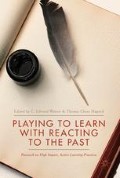Abstract
This chapter calls on a two-year data collection to assess the impact of the RTTP pedagogy on student engagement and self-concept. Adapting Barry and Finney’s (Meas Eval Couns Dev 42:197–222, 2009) College Self-Efficacy Survey, which measures students’ confidence in their ability to successfully accomplish various tasks facing college students, both social and academic, the authors asked open-ended questions about how the course changed the students and who was responsible for the students’ learning. Comparing students’ experiences across five Reacting-based courses, the authors found significant increase in students’ confidence on multiple measures. This increase was especially strong for women, who reported lower levels of overall confidence than men in pre-tests, but showed no differences in the post-test.
Access this chapter
Tax calculation will be finalised at checkout
Purchases are for personal use only
References
Bandura, A. (1986). Social foundations of thought and action: A social cognitive theory. Englewood Cliffs: Prentice Hall.
Barry, C. L., & Finney, S. J. (2009). Can we feel confident in how we measure college confidence? A psychometric investigation of the college self-efficacy inventory. Measurement & Evaluation in Counseling & Development, 42, 197–222. doi:10.1177/0748175609344095
Carnes, M. C. (2014). Minds on fire: How role-immersion games transform college. Cambridge, MA: Harvard University Press.
CAWP. (2015). Women in US congress 2015. Retrieved from http://www.cawp.rutgers.edu/women-us-congress-2015
Chemers, M. M., Hu, L., & Garcia, B. (2001). Academic self-efficacy and first-year college student performance and adjustment. Journal of Educational Psychology, 93, 55–64. doi:10.1037/0022-0663.93.1.55
Chow, E., Fleck, C., Fan, G., Joseph, J., & Lyter, D. (2003). Exploring critical feminist pedagogy: Infusing dialogue, participation, and experience in teaching and learning. Teaching Sociology, 31, 259–275.
D’Lima, G. M., Winsler, A., & Kitsantas, A. (2014). Ethnic and gender differences in first-year college students’ goal orientation, self-efficacy, and extrinsic and intrinsic motivation. Journal of Educational Research, 107(5), 341–356. doi:10.1080/00220671.2013.823366
Dweck, C. S. (2006). Mindset: The new psychology of success. New York: Random House.
Fish, S. (2010). The crisis of the humanities officially arrives. Retrieved from http://opinionator.blogs.nytimes.com/2010/10/11/the-crisis-of-the-humanities-officially-arrives/
Freire, P. (1970/2007). Pedagogy of the oppressed. New York: Continuum.
hooks, b. (1989). Talking back: Thinking feminist, thinking black. Boston: South Bend Press.
Kuh, G. D. (2008). High-impact educational practices: A brief overview. Retrieved from https://www.aacu.org/leap/hips
Lotkowski, V. A., Robbins, S. B., & Noeth, R. J. (2004). The role of academic and non-academic factors in improving college retention. Iowa City: ACT.
Pajares, E., & Schunk, H. D. (2001). Self-beliefs and school success: Self-efficacy, self-concepts, and school achievement. In R. Riding & S. Rayner (Eds), Perception (pp. 239–266). London: Ablex. Retrieved from http://www.uky.edu/~eushe2/Pajares/PajaresSchunk2001.html
Shrewsbury, C. M. (1993). What is feminist pedagogy? Women’s Studies Quarterly, 21(3/4), 8–16.
Sinclair, S. (2012). Confronting the criticisms: A Survey of attacks on the humanities. Retrieved from http://4humanities.org/2012/10/confronting-the-criticisms/
Stroessner, S. J., Beckerman, L. S., & Whittaker, A. (2009). All the world’s a stage? Consequences of a role-playing pedagogy on psychological factors and writing and rhetorical skill in college undergraduates. Journal of Educational Psychology, 101, 605–620. doi:10.1037/a0015055
Turner, P., & Thompson, E. (2014). College retention initiatives meeting the needs of millennial freshman students. College Student Journal, 48, 94–104.
Vuong, M., Brown-Welty, S., & Tracz, S. (2010). The effects of self-efficacy on academic success of first-generation sophomore students. Journal of College Student Development, 51, 50–64. doi:10.1353/csd.0.0109
Weiler, K. (1991). Freire and a feminist pedagogy of difference. Harvard Educational Review, 61, 449–475.
Zajacova, A., Lynch, M. S., & Espenshade, J. T. (2005). Self-efficacy, stress, and academic success in college. Research in Higher Education, 46, 677–706. doi:10.1007/s11162-004-4139-z
Author information
Authors and Affiliations
Editor information
Editors and Affiliations
Rights and permissions
Copyright information
© 2018 The Author(s)
About this chapter
Cite this chapter
Schult, C.A., Lidinsky, A., Zwicker, L.F., Dunn, E.E. (2018). Strengthening Students’ Self-Efficacy Through Reacting to the Past. In: Watson, C., Hagood, T. (eds) Playing to Learn with Reacting to the Past. Palgrave Macmillan, Cham. https://doi.org/10.1007/978-3-319-61747-3_4
Download citation
DOI: https://doi.org/10.1007/978-3-319-61747-3_4
Published:
Publisher Name: Palgrave Macmillan, Cham
Print ISBN: 978-3-319-61746-6
Online ISBN: 978-3-319-61747-3
eBook Packages: EducationEducation (R0)

